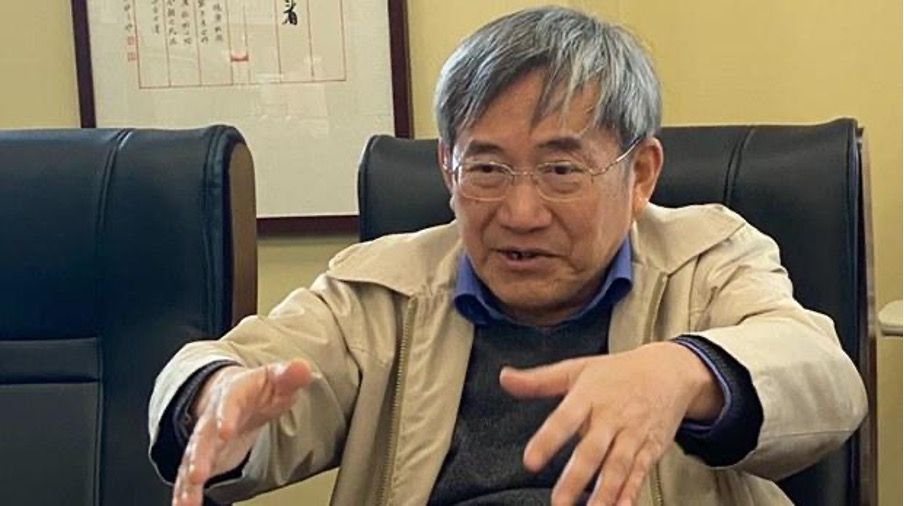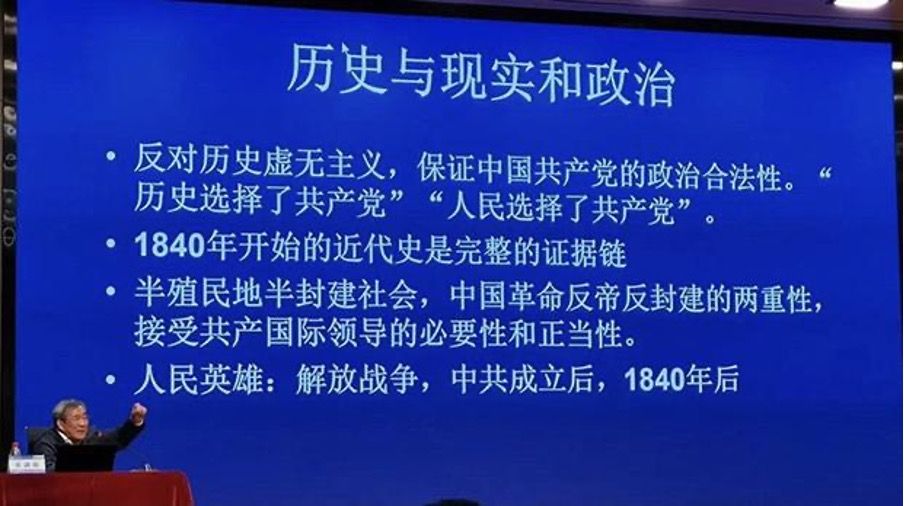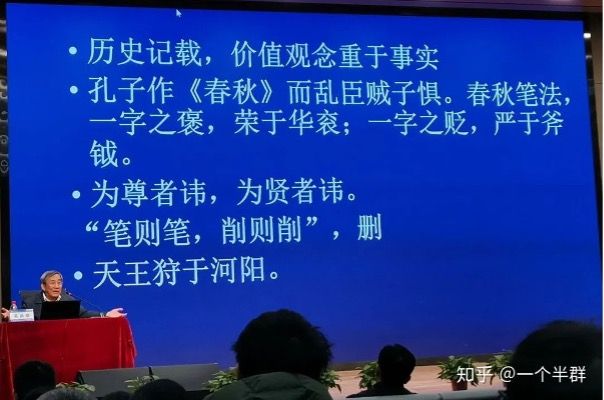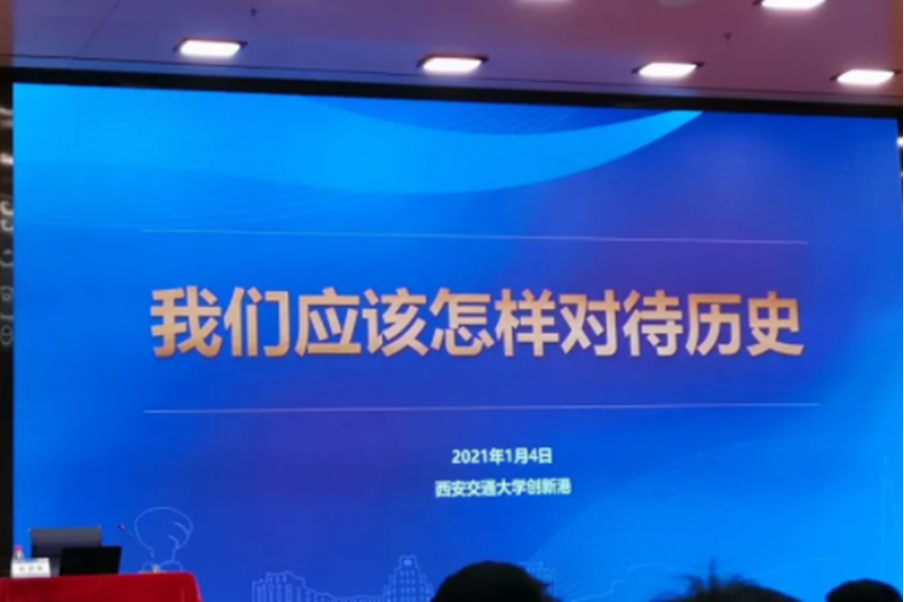
诞生于这个大时代,反对一切压迫和宰制的青年平台。关注思想交锋、社会运动,关心工人、农民、女性、全球南方等被损害者的真实处境,也通过写作和实践去想象、去创造别样的社会。网站:masseshere.com
Ge Jianxiong's "reverse practice" of left-wing historical theory: how to understand "rulers write history"?

Text|Splash Administration
The event of the historian Ge Jianxiong's lecture is still fermenting in the public opinion circle. Someone dug up a lecture he gave at the beginning of the year, "How Should We Treat History" , and on the slides of the live speech released, we can clearly see this view: "Historical research adheres to truth and respects facts; the application of results, the national interest comes first." He emphasized that China's thousands of years of historical records have always been that "values are more important than facts" and "emphasize political legitimacy and serve reality." Therefore, "history is to maintain the legitimacy of contemporary politics and the contemporary regime", so the study of modern Chinese history is to maintain the legitimacy of the victor in modern history - the Communist Party.
It's not just the statist rhetoric of intellectuals - in this day and age, such rhetoric, such intellectuals, is not unusual. The focus of public opinion is actually on the "degeneration" of Ge Jianxiong, because Ge Jianxiong was known for his "daring to speak" before, both academically and politically. His academic masterpiece "Unity and Divide: Enlightenment from Chinese History" (1994) boldly questioned the so-called "unification is the mainstream and division is the tributary" in the mainstream historians since 1949, and proposed that the total length of the period of division actually In a period of greater than unity, division is the norm . He went on to enumerate the various crimes of the unified regime and the various achievements of the split regime in the book, and demonstrated the "superiority" of the split under the historical conditions of the feudal era. As a member of the Standing Committee of the National Committee of the Chinese People's Political Consultative Conference, Ge Jianxiong is also nicknamed "Ge Dapao" because he dares to speak out at the CPPCC meeting and dare to question officials. So how did he get there?

Two interpretations of "rulers write history"
In the critique of Ge Jianxiong's remarks, there is a typical liberal response: how can historical research serve contemporary regimes? Of course history should be objective and true and independent of politics; only in the context of contemporary China can history serve the regime! For example, "Weizhou" wrote in an article commenting on the Ge Jianxiong incident:
Ideally, the best (for the relationship between history and politics) may be neither "permitted liberty", nor, perhaps, irrespective of violent conflict, but "God's to God, Caesar's to Caesar", when The separation of the two means that realpolitik does not need to seek legitimacy from history, thus truly liberating historical research .
In principle, we strongly agree that the ideal academic field should guarantee free research, democratic discussion, and oppose the violent interference of statist censorship machines. But the so-called "when the two are separated, real politics does not need to seek legitimacy from history" is really full of the naivety unique to classical liberalism. "Weizhou" went on to write:
But if that day comes, as we are seeing in developed countries today, we may find that from politicians to ordinary people, the interest in history will also be greatly diminished. After all, the Chinese people's interest in history is actually an interest in politics in many cases .
Is the interest in history also part of the so-called "national character" of the Chinese people? I wonder how progressive people and progressive intellectuals in developed countries would feel if they read this passage? If it is true that “developed country” regimes have less direct and violent intervention in historical research, then their public interest in history will not be diminished. To give a simple example: After the Black Lives Matter movement in the United States in 2020, public interest in the history of the Black Panther Party in the 1960s and 1970s increased greatly. For example, as many as 2 Black Panther-themed films ("Judas and the Black Messiah" and "The Trial of the Chicago Seven") appeared in this year's Oscar nominations list (a total of 8). In the past few decades, American public opinion and the historical writing of the "non-violent" Martin Luther King, "violent" Malcom X and the Black Panther Party in the mass media have also continuously shaped people's perception of the current black movement. History has always been about reality - "all history is contemporary history", whenever and wherever.
Criticism of Ge Jianxiong's remarks should begin precisely by acknowledging the correctness of the view that "history has always served reality". Facing the accusations of liberals, Ge Jianxiong responded: "Didn't I just pierce a layer of window paper? Why do you make such a fuss?". Indeed, Ge Jianxiong just reiterated the basic facts that have long been revealed by left-wing critical theory and philosophy of history: in class society and patriarchal society, history, as an important part of ideology-superstructure, in most cases can only serve The interests of the ruling class, the ruling gender group. As Benjamin put it in his "Theses on the Philosophy of History":
All rulers are descendants of the victors who came before them. Thus the empathy sent to the victor always invariably benefits the ruler. Historical materialists understand what this means. He who ascends the throne of victory enters the age in triumph, and the ruler of the moment is stepping over the conquered who crawls at his feet. Traditionally, the spoils of war were also carried by the triumphant team. These trophies became cultural treasures.

History, as a type of what Benjamin called "cultural wealth", is the spoils of war carried by the victor-rulers. However, as a left wing, what we need to ask further is: what happens after "piercing the window paper"? When we understand that history is the history of the rulers, can we take the initiative to explore and write the history outside the rulers (the history of workers and peasants, women, the third world, ethnic minorities, LGBTQ, etc.), to participate in the transformation of society , in action to challenge domination relationships? Or are we more skilled, more convincing, and more shameless in writing history for our rulers? Hannah Arendt, on totalitarian history writing, points out:
They are not particularly angry at the mass falsification of historiography, which is part of all totalitarian governments anyway, and they have clearly declared themselves to be involved in totalitarian propaganda. They believe that traditional historiography is falsified because it excludes human memory of the disenfranchised and the oppressed. ... Marx's attempt to rewrite world history in terms of class struggle attracted even those who did not believe in the validity of his arguments . [i]
Although we disagree with Arendt's view of classifying both communism and fascism as "totalitarian" from a liberal standpoint, her analysis is still worth pondering on the left today. When Marx points out that traditional historical writing excludes the oppressed and is therefore "falsifying", we must see that he may also have an unexpected audience of right-wing fascist readers: people who do not care about Marx's intentions (i.e. class struggle), just trying to find an excuse to openly falsify in historiography.
Right-wing "reverse training" of left-wing theory
It can be said that the case of Ge Jianxiong perfectly demonstrates another case of "reverse training" left-wing critical theory. The popularity of the term "reverse training" originated from the "reverse training" of the French philosopher Michel Foucault in a study class at BFSU in 2019. In "Discipline and Punishment", Foucault described the surveillance and control of people by the technology called "Panorama Prison". It is generally believed that Foucault is critical of such technologies, but a student work of the class, "Panorama and Its Implications for the Construction of Chinese Social Integrity," argues that we should use similar technologies on a large scale .
So, why is left-wing critical theory being "reversed"? In the discussion triggered by "reverse training Foucault", some analysts have pointed out:
First, left-wing critiques are based on characterizations of current society. Even if this characterization is exaggerated or abstract, it needs to accurately capture the core shape of society. Second, left-wing critiques should not take this characterization of society as an end point, but should set the agenda to build a different future society. As long as left-wing criticism achieves the first but not the second, or discusses the second but is ignored or erased, then of course it may be used by those it criticizes—because it accurately It depicts social reality. That's why the second rule is important. [ii]
In other words, left-wing theories describe and criticize the current society and all the unequal and unfree societies that have existed in history in order to transform such reality and create an ideal society in the future. Left-wing critical theory is in danger of being exploited by its enemies if it loses its vision of the future society and its actions to transform it. Because left-wing critical theories often tear off the cloak and fig leaf of the current "civilized society" and "harmonious society", revealing all kinds of violence, cruelty, oppression and bloodshed beneath the surface - the so-called "no monument of civilization is also a A true record of savage violence.” [iii] As mentioned earlier, the Left exposes the sordid face of reality in order to transform it. However, once this premise is lost, the acceptance of left-wing critical theory may undergo a sea change - aren't the rules of reality so dirty? Now that we have learned the rules of real society, can't we play this set of dark games better? Stop pretending to be a hypocrite, stop talking about civilization and harmony, let's be real villains, let's be naked and cruel!
So we will find that in addition to Ge Jianxiong's "history is to serve the regime", the current Chinese public opinion circle is also full of various "reverse exercises" of left-wing theory and analysis. For example, the radical left criticizes the "political correctness" of the West because it only guarantees racial and gender equality at the discourse level, and does not intend to solve the structural injustice in reality. The little pinks practice their criticism of "political correctness" in this way: You claim to be racial equality, but don't you actually discriminate against black people? You are too hypocritical and too weak, unlike me, I dare to blatantly discriminate against black people!
Even the ideological foundation of the entire reform and opening up can be regarded as a large-scale "reverse exercise" of Marxism and materialism. The so-called "the essence of socialism is the liberation and development of productive forces" put forward by Deng Xiaoping is still lingering, and it still constitutes the cornerstone of mainstream ideologies such as the "Industrial Party". This "reverse training" not only rationalized the transformation from socialism to capitalism, but also created an unprecedented culture of money worship, fetishism, and social Darwinism in China in the early days of reform and opening up. The inner logic is this: Are we not materialists? Isn't our task to develop productive forces? So, whoever can "develop productivity" the most - making big money - is the most honorable, isn't it? As atheists, money is our religion!
As a result, the naked money-worshiping culture presented in China in the early days of reform and opening up was not only vastly different from the Mao era, but even more so than most Western capitalist societies. This is because in the history of the development of Western capitalism, although the bourgeoisie quickly grasped the economic and political dominance, its culture has always competed with the aristocratic culture and religious culture for cultural hegemony, and has not been able to achieve it. Complete victory [iv] . It can be said that in the cultural field, the bourgeoisie has a certain "innate deficiency", characterized by the "ruthless cash transactions" described in the "Communist Manifesto", the "ice water of egoistic planning", the lack of "feudal, patriarchal" The "onset of sacred sentiments of religious piety, chivalrous zeal, and burgher sentimentality" possessed by the "romantic and idyllic relationship" lacks the attraction and superiority conferred by the system of cultural meaning. On the other hand, our country quickly solved this "inherent deficiency" by "reversing" materialism and Marxism, and established the "glorious" image and cultural hegemony of capitalism and the bourgeoisie.
Conclusion: How does the left use history to serve reality?
As a left wing, we absolutely do not agree with the "reverse training" of the nationalism of the left wing theory by the likes of Ge Jianxiong. At the same time, we do not fully agree with the arguments and viewpoints adopted by liberals when criticizing Ge Jianxiong. When liberals claim that their historical research is objectively neutral and depoliticized, their research is in fact often promoting a certain realistic political agenda, which is the “depoliticized politics” unique to liberalism. The author wrote earlier that the criticism of Ge Jianxiong's remarks should start with the correctness of the view that "history has always served reality". Then, the question arises: as a left wing, how can we use history to serve reality? In other words, what kind of reality do we serve?

In his lecture, Ge Jianxiong focused on the study of modern Chinese history, and believed that the victory of the Communist Party was "history chose the Communist Party" and "the people chose the Communist Party", and it would be "historical nihilism" to oppose its leadership through history. The history of modern Chinese revolution is of course one of the areas that the left wing cares most about, but the left wing does not use revolutionary history to serve the current regime, but to serve the oppressed today. In addition to participating in actions that directly transform reality, the left also needs to compete for leadership in the ideological and cultural fields (including history), so that the oppressed people have the weapons of criticism. Today, to write revolutionary history with a left-wing perspective is to tell people that change is not impossible; it is to tell people: it has always been so, right?
[i] Arendt: The Origins of Totalitarianism (Chapter 10: "Classless Society")
[ii] Simon Luo's Zhihu replied: "What do you think of BFSU teachers' response to recent disputes in the column Foucault Research?"
[iii] Benjamin: Theses on the Philosophy of History
[iv] Regarding why the Western bourgeoisie has not been able to achieve cultural hegemony, see Cheng Wei: Children of the Middle Class: The 1960s and Cultural Leadership
Like my work?
Don't forget to support or like, so I know you are with me..

多数派正在派送中

诞生于这个大时代,反对一切压迫和宰制的青年平台。关注思想交锋、社会运动,关心工人、农民、女性、全球南方等被损害者的真实处境。
Comment…